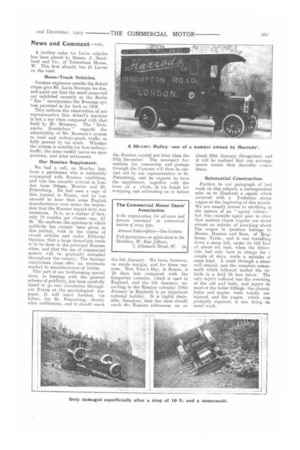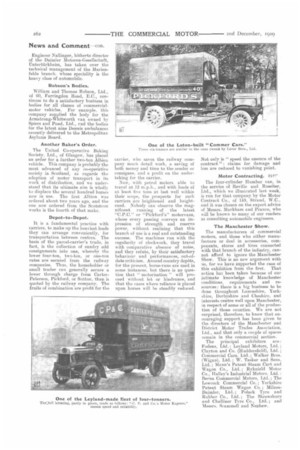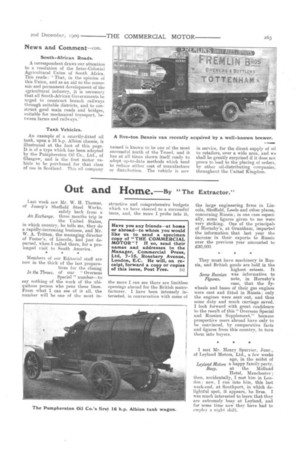News and Comment.
Page 8

Page 9

Page 10

Page 11

If you've noticed an error in this article please click here to report it so we can fix it.
This journal is about to issue its Seventh Export Special Number : it will be a New Year's message.
Eastern Trade--an important decision is announced on the first page in this issue.
The Import Duty, in Russia, is only £7 9s. (70 roubles) per chassis, irrespective of weight.
A new petrol lorry, in that it is now after a full two years of hard testing a proved success, is described and illustrated on pages 256 and 257.
Captain Cecil Battine lectured at the Royal Automobile Club, yesterday (Wednesday) evening, on the subject of " The Use of Motor Vehicles in War."
Mr. Scott, the controller of the Edinburgh postal district, will control the parcel motor-mail service, between Edinburgh and Glasgow, which was inaugurated yesterday (Wednesday) with Albion vehicles.
R.A.C. Founders.
At the founder members' dinner of the R.A.C., on the night of the 24th ult., at the Hotel Great Central, Marconigrams were exchanged with Mr. Frederick R. Simms, on board the es. " Mauretania," en route for New York.
R.A. S. E.
Members of the Royal Agricultural Society of England, who are readers of this journal, are reminded that the annual general meeting of governors and members will be held, in the club-room, at the Agricultural Hall, Islington, N., on Wednesday next the 8th inst., at 3 p.m.
Another Glasgow Tender.
Glasgow Corporation, through its Town Clerk, Mr. A. W. Miles, requires to receive tenders for a motor-ambulance wagon, not later than to-morrow (Friday). We are bound to remark that the notice in this matter has been rather short: so far as we can ascertain, a brief advertisement was first inserted in the " Glasgow Herald" on the 22nd November. No h.p. is specified, and one patient is to he carried. Willesden Fire Brigade.
The tenders, to which we referred last week (page 242 ante), must be lodged on or before the 14th inst.
Edmonton's Ambulance.
The Edmonton Board of Guardians, which accepted a tender some weeks ago, for the supply of a motor ambulance by the Belle Isle Co.. has decided to invite tenders afresh, on the ground that the vehicle was not of the class they wanted. One member remarked that it " Was a coal wagon ." It is a pity that Boards of Guardians so often fail to take advantage of expert advice when ordering : specifications are often unintelligibly wide.
BeIsize Motors,
Mr. G. P. Danson, presiding at the annual general meeting of the shareholders in Belsize Motors, Ltd., on Thursday last, remarked upon the satisfactory position of the company's commercial-vehicle department, which had been initiated by the sale of four-cylinder cabs. A dividend at the rate of six per cent. per annum, less income tax, was approved, and we compliment the directors of this company on their net profit, for the year ended the TM' September last, of e13.2SS.
New Mail Contract.
The Postmaster-General is asking tenders for the conduct of a motor parcel-mail service, between Warrington and Burnley, and in the reverse direction. Tenders must be lodged not later than 3 p.m. on Friday the 17th inst.
Remington Motors.
The Remington Motor Co., Ltd. (private company), was registered, on the 23rd ult., with a nominal capital of ,C100 in LI shares, to carry on the business of manufacturing, etc., motorcars and carriages of all kinds, etc. Signa tories, I. Langley and G. Langley, both of 40, Swanswell Terrace, Covent ry.
Mr. H. G. Burford, now representing Humber, Ltd., has been re-elected to the Management Committee and Council of the Society. On the 24th ult., Colonel Mulliner, Mr. W. Lawton Goodman, and Mr. litlian A. Flalford represented the Society, at a meeting of the railway department of the Board of Trade, on the subject of railway rates.
Nom-registration of Motor Lorry.
At the Manchester City Police Court, before the Stipendiary (Mr. Edgar Brierley), Austin Langton, a driver in the employ of the Leyland Motors, Ltd., was summoned for that he unlawfully did use a motorvan in Withington without the same being registered. Leyland Motors, Ltd., was summoned for aiding and abetting. Mr. W. E. Rowcliffe, who appeared for the defendants, pleaded "guilty " to a technical offence. He explained to the Bench that the van in question was an experimental one which had been sent to the P. G. R. Motor Spirit Co. for a trial test. The motorvan was not registered, although it carried a registration No. "9. 6. K." instead of a manufacturer's trial number ; it was only intended to be in use for a fortnight on trial. It was during this period, namely, on the 29th October, that the defendant Langton wee stopped in the street by a constable, who informed him that the van was not registered, and that he would have to report the matter. Mr. Roweliffe explained that, owing to pressure of business, and entirely by an oversight of one of the clerks in handing out to the driver the wrong number plate, the error occurred, and that the driver was in no way to blame. The registration certificate was taken out on the 1st November.
The Stipendiary dismissed the sunsmons against the driver, and imposed a fine of 5s. and costs upon Leyland Motors, Ltd., and we form of pleading in these eases might be noted with a rive nta ge A further order for Lacre vehicles has been placed by Messrs. J. Shoolbred and Co., of Tottenham House, W. This firm already has 45 Lacres on the road.
Mono-Track Vehicles.
German engineers outside the Scherl clique give Mr. Louis Brennan his due, and point out that the small mono-rail car exhibited recently at the Berlin " Zoo " incorporates the Brennan system patented as far back as 1903.
They endorse the observation of our representative that Scherl's machine is but a toy when compared with that built by Mr. Brennan. The " Technische Riindschau " regards the adaptability of Mr. Brennan's system to road and railway-goods traffic as fully proved by his trials. Whether the system is suitable for fast railwaytraffic, the same weekly leaves an open cinestion, and later settlement.
Our Russian Supplement.
We had a call, on Monday last, from a gentleman who is intimately acquainted with Russian conditions, and who has recently arrived in London from Odessa. Moscow and St. Petersburg. He had seen a copy of this journal in Russia, and he was amused to hear that some English manufacturers were under the impression that the Russian import duty was enormous. It is, as a matter of fact, only 70 roubles per chassis—say, £7 9s. He confirms the opinions to which publicity has already been, given in this journal, both in the course of recent articles and under Editorial Opinion, that a large immediate trade is to be done in the principal Russian cities, and that the use of commercial motors will be gradually extended throughout the country. The haulage contractors alone offer an enormous market to manufacturers of lorries.
This part of our forthcoming special issue, in keeping with the general scheme of publicity, has been carefully timed to go into circulation throughout Russia at the psychological moment. It will leave London, via Libau, for St. Petersburg, shortly after publication, and it should reach the Russian capital not later than the 25th December. The necessary formalities for censorship and passage through the Customs will then be carried out by our representative in St_ Petersburg, and he expects to have the supplement, together with the issue as a whole, in his hands for wrapping and addressing on or before the 9th January. We have, however, an ample margin, and for these reasons. New Year's Day, in Russia, is 13 days late compared with the Gregorian calendar, which is used in England, and the 6th January, according to the Russian calendar (19th January in England) is an important national holiday. It is highly desirable, therefore, that the issue should reach th ?, Russian addressees on or about 26th January (Gregorian), and it will be realized that our arrangements insure that desirable coincidence.
Substantial Construction.
Further to our paragraph of last week on this subject, a correspondent asks us to illustrate a smash which occurred with a Yorkshire steam wagon at the beginning of this month. We are usually averse to anything in the nature of an " agony column,but this example again goes to show that modern steam wagons can stand almost an infinity of knocking &milt The wagon in question belongs to Messrs. Hanson and Sons, of Brighouse, Yorks., and it was travelling down a steep hill, under its full load of about six tons, when the driver. who had only been in charge for a couple of days, made a mistake of some kind. A crash through a stone wall ensued, and the complete somersault which followed landed the vehicle in a field 10 feet below. The only injury suffered was the wrecking of the cab and body, and injury to most of the boiler fittings: the chassis, boiler and engine were totally uninjured, and the wagon, which was promptly repaired. is now doing its Hanel work.
Engineer Na!linger, hitherto director of the Daimler Motoren-Gesellachaft, Unterttirkheim, has taken over the technical management of the Marionfelde branch, whose speciality is the heavy class of automobile.
Robson's Bodies.
William and Thomas Robson, Ltd., of 60, Farringdon Road, B.0_, continues to do a satisfactory business in bodies for all classes of commercialmotor vehicles. For example, this company supplied the body for the Armstrong-Whitworth van owned by Spiers and Pond. Ltd., vnd the bodies for the latest nine Dennis ambulances recently delivered to the Metropolitan Asylums Board.
Another Baker's Order.
The United Co-operative Baking Society, Ltd., of Glasgow, has placed an order for a further two-ton Albion vehicle. This company is probably the most advanced of any co-operative society in Scotland, as regards the adoption of motor transport in its work of distribution, and we understand that its ultimate aim is whelly to displace the several hundred horses now in use. The first Albion was ordered about two years ago, and the one now ordered from the Scatstoun works is the fourth of that make.
Depot-to-Depot.
It is a fundamental practice with carriers, to make up the heaviest loads they can arrange conveniently, for transportation between centres. The basis of the parcel-carrier's trade, in fact, is the collection of sundry odd consignments into one, whereby the lower four-ton, two-ton, or one-ton rates are secured from the railway companies. Thus, the householder or small trader can generally secure a lower through charge from CarterPaterson, Pickfard, or Sutton, than is quoted by the railway company. The fruits of combination are profit for the
carrier, who saves the railway company much detail work, a saving of both money and time to the sender or consignee, and a profit on the undertaking for the carrier.
Now, with petrol motors able to travel at 12 m.p.h., and with loads of at least five tons at last well within their scope, the prospects for such carriers are brightened and heightened. Nobody can observe the magnificent running of the latest
or "Pickford's" matorvans, whose every passing conveys an impression of strength and reserve power, without realizing that this branch of use is a real and outstanding slICCeeS. The machines run with the regularity of clockwork, they travel with comparative absence of noise, and they refute, by their satisfactory behaviour and performances, out-ofdate criticism. Around country depots, for the present, horse-vans are used in some instances. but there is no question that '1 motorisation " will proceed without let or hindrance, and that the cases where reliance is placed npon horses will be steadily reduced.
Not only is " speed the essence of the contract" : claims for damage and loss are reduced to vanishing point.
Motor Contracting. 2137.r^
The four-cylinder Humber van, in the service of Reville and Rossiter, Ltd., which we illustrated last week, is run for that company by the Motor Contract Co., of 143, Strand, W.C., and it was chosen on the expert advice of Messrs. Markham and Prance, who will be known to many of our readers as consulting automobile engineers.
The Manchester Show.
The manufacturers of commercial motors, and those who either manufacture or deal in accessories, components, stores and tires connected with that branch of the industry, cannot afford to ignore the Manchester Show. This is no new argument with us, for we have supported the case of this exhibition from the first. That action has been taken because of our intimate knowledge of Manchester conditions, requirements and resources: there is a big business to be done throughout Lancashire, Yorkshire, Derbyshire. and Cheshire, and interests centre well upon Manchester, in respect of some or all of the production of those counties. We are not surprised, therefore, to know that encouraging support has been given to the directors of the Manchester and District Motor Trades Association, Ltd., and that only a couple of spaces remain in the commercial section.
The principal exhibitors are: Foclens, Lid.; Leyland Motors, Ltd. ; Clayton and Co. (Huddersfield), Ltd. ; Commercial Cars, Ltd.; Walker Bros. (Wigan), Ltd.; W. Tasker and Sons, Ltd. ; Mann's Patent Steam Cart and Wagon Co., Ltd. Rykniekl Motor Co., Halley's Industrial Motors, Ltd. : Berna Commercial Motors, Ltd. ; The Lowcock Commercial Co.; Yorkshire Patent Steam Wagon Co.; MilnesDaimler, Ltd.; Polack Tyre and Rubber Co., Ltd. ; The Shrewsbury and Challiner Tyre Co., Ltd. ; and Messrs. Scammell and Nephew.
News and Comment—con. South-African Roads.
A correspondent draws our attention to a resolution of the Inter-Colonial Agricultural Union of South Africa. This reads: That, in the opinion of this Union, and as an aid to the economic and permanent development of the Agricultural industry, it is necessary that all South-African Governments be urged to construct branch railways through suitable districts, and to construct good main roads and bridges, suitable for mechanical transport, between/arms and railways.
Tank Vehicles.
An example of a smartly-fitted oil tank, upon a 16 h.p. .Albion chassis, is illustrated at the foot of this page. It is of a type which has been adopted by the Pumpherston Oil Co., Ltd., of Glasgow, and is the first motor vehicle to be purchased for that class of use in Scotland. This oil company
named is known to be one of the most successful north of the Tweed, and it has at all times shown itself ready to adopt up-to-date methods which tend to reduce either cost of manufacture or distribution. The vehicle is now in service, for the direct supply of oil to retailers, over a wide area, and we shall be greatly surprised if it does not prove to lead to the placing of orders, by other oil-distributing companies, throughout the United Kingdom.


















